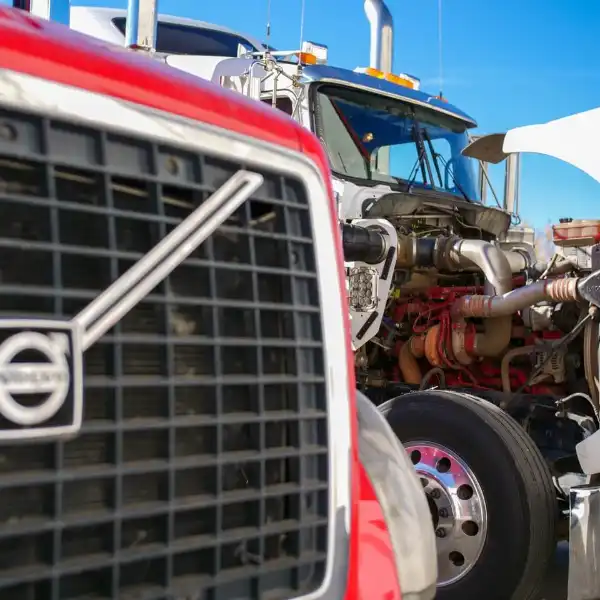Maintaining the engine of your Peterbilt 379 is crucial to ensuring its optimal performance and longevity. As a workhorse in the commercial trucking industry, the Peterbilt 379 demands regular upkeep to keep it running smoothly and efficiently.
Understanding the Peterbilt 379 Engine
Engine Overview
The Peterbilt 379 is known for its robust engine options, predominantly featuring Caterpillar and Cummins engines. These engines are renowned for their power, durability, and efficiency, making them ideal for heavy-duty trucking.
- Caterpillar Engines: The CAT engines, like the 3406E and C15, offer a range of horsepower from 435 to 550 hp with torque outputs ranging from 1,550 to 1,850 lb-ft. These engines are celebrated for their torque-heavy performance, essential for hauling heavy loads over long distances.
- Cummins Engines: The Cummins ISX series is another popular choice, providing horsepower ranging from 400 to 600 hp and torque outputs from 1,450 to 2,050 lb-ft. Cummins engines are known for their fuel efficiency and reliability, making them a favorite among fleet operators.
Critical Engine Components
To maintain peak performance, it’s essential to understand the critical components of the Peterbilt 379 engine:
- Turbocharger: Enhances engine power and efficiency by forcing more air into the combustion chamber. Regular inspections are necessary to avoid issues such as reduced power and increased fuel consumption.
- Fuel Injectors: Deliver fuel into the combustion chamber at high pressure for optimal combustion. Faulty injectors can lead to poor engine performance and increased emissions.
- Cooling System: Keeps the engine temperature within optimal limits. Components like the radiator, coolant hoses, and water pump need regular checks to prevent overheating.
- After-Treatment Devices: These include the diesel particulate filter (DPF) and selective catalytic reduction (SCR) systems that reduce emissions. Regular maintenance ensures compliance with environmental regulations and avoids performance issues.
Common Issues
While the Peterbilt 379 is a reliable truck, it’s not immune to problems. Common engine issues include:
- Overheating: Often caused by coolant leaks, a malfunctioning water pump, or a clogged radiator. Regular coolant checks and system inspections are vital.
- Fuel System Problems: Issues such as clogged fuel filters or failing fuel pumps can lead to engine misfires and reduced performance. Regular filter replacements and fuel system cleaning are crucial.
- Turbocharger Failures: Symptoms include a loss of power, excessive exhaust smoke, and unusual noises. Early detection and repair can prevent more severe damage.
Routine Maintenance Practices for Engine Performance
Regular Oil Changes
Oil changes are the backbone of engine maintenance. Adhering to the manufacturer’s recommended intervals is crucial for the health of your Peterbilt 379 engine.
- Choosing the Right Oil: Select high-quality oil that meets the specifications for your engine type. Synthetic oils can offer better performance and longer intervals between changes.
- Oil Filters: Always replace the oil filter with each oil change to ensure contaminants are effectively removed from the engine oil.
Fuel System Maintenance
Maintaining a clean fuel system is essential for optimal engine performance.
- Changing Fuel Filters: Regularly replace fuel filters to prevent clogs that can reduce fuel flow and engine performance.
- Fuel Additives: Using quality fuel additives can help clean the fuel system and improve fuel efficiency. Additives can also prevent fuel gelling in colder climates.
- Monitoring Fuel Quality: Ensure that you are using high-quality fuel to prevent deposits and other fuel-related issues.
Coolant System Checks
Keeping the coolant system in top condition is critical to prevent engine overheating.
- Inspect Coolant Levels: Regularly check and top off coolant levels. Use the manufacturer-recommended coolant type.
- Check for Leaks: Inspect the radiator, hoses, and water pump for leaks or signs of wear. Replace any damaged components immediately.
- Radiator Maintenance: Ensure the radiator is clean and free of obstructions. Over time, debris can accumulate, reducing its efficiency.
Advanced Diagnostic and Troubleshooting Techniques
Using Diagnostic Tools
Modern diagnostic tools are indispensable for maintaining the Peterbilt 379 engine.
- Reading Fault Codes: Use an OBD-II scanner to read and interpret fault codes. This can help you identify issues before they become major problems.
- Monitoring Engine Parameters: Tools like the Cummins INSITE or CAT ET allow you to monitor vital engine parameters, such as oil pressure, coolant temperature, and fuel rail pressure, providing valuable insights into engine health.
Identifying Performance Issues
Effective troubleshooting is key to resolving performance problems quickly.
- Loss of Power: If you notice a significant drop in power, check for issues with the fuel system, turbocharger, or air intake.
- Abnormal Noises: Unusual noises like knocking or hissing can indicate problems with the engine internals, such as worn bearings or a failing turbocharger.
- Excessive Smoke: Blue smoke may indicate oil burning, while black smoke suggests incomplete combustion. Investigate the underlying causes promptly.
When to Seek Professional Help
While many issues can be resolved with routine maintenance and diagnostics, some situations require professional expertise.
- Complex Engine Repairs: For major repairs like cylinder head or turbocharger replacements, consult certified Peterbilt technicians.
- Persistent Problems: If an issue persists despite troubleshooting efforts, professional diagnostics can help identify and resolve the root cause.
Seasonal Maintenance Tips to Ensure Year-Round Reliability
Winter Maintenance
Winter conditions pose unique challenges for diesel engines. Preparing your Peterbilt 379 for cold weather is crucial.
- Winter-Grade Oil: Use oil formulated for lower temperatures to ensure proper lubrication and easier starts.
- Battery Check: Cold weather can affect battery performance. Ensure your battery is fully charged and in good condition.
- Fuel System Care: Add anti-gel additives to prevent fuel from gelling in cold temperatures. Keep the fuel tank as full as possible to reduce condensation and moisture.
Summer Maintenance
Hot weather can strain the engine’s cooling system, making summer maintenance equally important.
- Coolant System Inspection: Regularly check coolant levels and inspect the radiator and hoses for leaks or damage.
- Air Filter Replacement: Dust and debris can clog air filters faster in the summer. Replace filters more frequently to ensure optimal air intake.
- Monitor Coolant Levels: Ensure the coolant mix is correct and top up as necessary. Overheating is a common issue during the summer months.
Keep Your Engines in Top Shape
By adhering to these engine maintenance tips, you can ensure that your Peterbilt 379 remains in peak condition, providing reliable performance and efficiency. Regular maintenance not only extends the life of your engine but also enhances safety and reduces operational costs. Stay proactive with your maintenance schedule, and your Peterbilt 379 will continue to be a dependable asset for your trucking operations.

